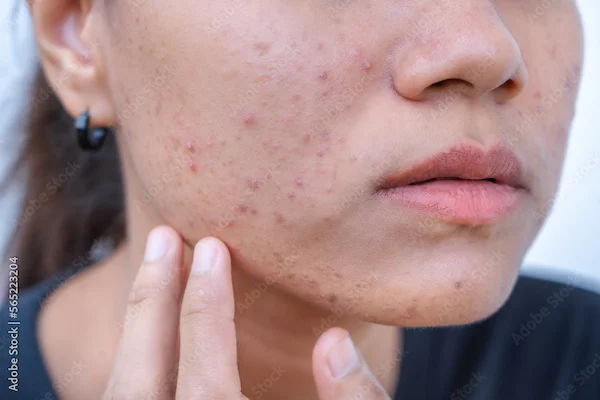Azithromycin for Acne
Learn how Azithromycin helps treat acne, its benefits, dosage, potential side effects, and tips for safe use. Discover if this antibiotic is the right option for your skincare needs.

Written by Dr Sonia Bhatt
Last updated on 13th Jan, 2026
Acne vulgaris, commonly known as acne, is a chronic inflammatory skin condition affecting millions worldwide. Characterised by the presence of pimples, blackheads, whiteheads, and sometimes cysts, acne often appears on the face, chest, back, and shoulders. While commonly associated with adolescence, acne can affect individuals of all ages, leading to significant physical and emotional distress.
Antibiotics have long been a cornerstone in treating moderate to severe acne, especially when there are inflammatory lesions. They work by reducing the population of acne-causing bacteria (Cutibacterium acnes) and decreasing inflammation. Azithromycin has emerged as a notable option among the various antibiotics available due to its efficacy and safety profile. This article delves into how azithromycin works for acne, when to use it, potential side effects, and other important considerations, including its dosing regimen and patient-specific precautions.
How Does Azithromycin Work for Acne?
Azithromycin is a potent antibiotic that tackles acne by addressing two main issues: bacterial growth and inflammation. First, it stops the acne-causing bacteria, Cutibacterium acnes, from growing and multiplying. It does this by binding to the bacterial ribosome, which is crucial for protein production. Without these essential proteins, the bacteria cannot thrive, leading to a reduction in their numbers on the skin.
In addition to its antibacterial action, azithromycin also has anti-inflammatory properties. Acne isn't just about bacteria; inflammation plays a significant role in the development of acne lesions. Azithromycin helps to reduce this inflammation by inhibiting the production of pro-inflammatory cytokines, which are signalling molecules that can worsen inflammation. By curbing both bacterial growth and inflammation, azithromycin provides a comprehensive approach to managing acne, making it an effective treatment for many individuals struggling with this condition.
When Is Azithromycin Used for Acne?
Azithromycin is typically considered for acne treatment in specific cases where other methods have not been successful or when particular conditions warrant its use. Here are the primary scenarios in which azithromycin might be prescribed for acne:
Moderate to Severe Acne: Azithromycin is often used for individuals with moderate to severe acne, particularly when there are numerous inflamed lesions, nodules, or cysts. These severe forms of acne usually require more potent interventions beyond over-the-counter or mild prescription treatments.
Treatment-Resistant Acne: When acne does not respond to first-line treatments, such as topical agents (like benzoyl peroxide or retinoids) or other oral antibiotics (like tetracyclines), azithromycin may be considered. Its unique properties and different mechanisms of action make it a viable alternative for stubborn cases.
Inflammatory Acne: Azithromycin is particularly effective in cases of inflammatory acne due to its anti-inflammatory properties. It can help reduce redness, swelling, and discomfort associated with inflamed acne lesions, making it suitable for individuals with this type of acne.
Adjunct Therapy: In some instances, azithromycin may be used in conjunction with other acne treatments to enhance overall efficacy. Combining azithromycin with topical treatments or other oral medications can provide a more comprehensive approach to acne management.
Patients Intolerant to Other Antibiotics: For patients who experience significant side effects or allergic reactions to other commonly used antibiotics, azithromycin may be a suitable alternative. Its different side effect profile can be more tolerable for certain individuals.
How Is Azithromycin Administered for Acne?
Azithromycin is typically prescribed as an oral medication for the treatment of acne. The administration and dosing regimen can vary based on the severity of the acne and the individual's response to the medication. Here are the key aspects of how azithromycin is administered for acne:
1. Dosage Form: Azithromycin is available in various forms, including tablets, capsules, and liquid suspensions. The choice of form depends on the patient's preference and any specific considerations made by the healthcare provider.
2. Dosing Regimen: Unlike some antibiotics that require daily dosing, azithromycin is often administered using a "pulse therapy" approach for acne. This regimen typically involves taking azithromycin for a few consecutive days each week, followed by drug-free days. A common regimen might be 500 mg taken three times a week (e.g., Monday, Wednesday, and Friday) for a duration of 8-12 weeks. This intermittent dosing schedule helps maintain effective levels of the antibiotic in the body while minimising side effects and reducing the risk of antibiotic resistance.
3. Treatment Duration: The duration of azithromycin treatment for acne varies based on the individual's response and the severity of the condition. Treatment periods can range from a few weeks to several months. In cases of mild to moderate acne, a shorter course may be sufficient to manage flare-ups. For more severe forms of acne, a longer treatment regimen may be necessary to achieve and maintain desired results.
4. Adherence to Prescribed Regimen: It is crucial for patients to adhere to the prescribed dosing schedule to achieve optimal results. Skipping doses or not completing the full course of treatment can reduce the effectiveness of the therapy and increase the risk of developing antibiotic resistance.
5. Monitoring and Follow-Up: Regular follow-up appointments with a healthcare provider or dermatologist are important to monitor progress, assess the effectiveness of the treatment, and make any necessary adjustments to the regimen. Patients should report any side effects or concerns to their healthcare provider to ensure safe and effective use of azithromycin.
Who Should Avoid Azithromycin for Acne?
While azithromycin can be an effective treatment for acne, it is not suitable for everyone. Some individuals should avoid azithromycin or use it with caution, including:
People with a history of heart disease: As azithromycin can affect heart rhythm, those with arrhythmias or other heart conditions should avoid it unless prescribed by their doctor.
People with liver disease: If you have liver conditions, azithromycin should only be taken under close supervision.
Pregnant and breastfeeding women: Although azithromycin is classified as a Category B drug for pregnancy, meaning it is generally considered safe, it should only be used when clearly needed, and the potential benefits outweigh the risks. Always consult a doctor before taking any medication while pregnant or breastfeeding.
Potential Side Effects of Azithromycin
While azithromycin is generally well-tolerated, it's important to be aware of potential side effects to ensure safe and effective use. Here are some of the most common and significant side effects associated with azithromycin:
Gastrointestinal discomfort: Symptoms may include nausea, vomiting, diarrhoea, or abdominal pain.
Allergic reactions: Reactions can manifest as rash, itching, or swelling, especially in individuals with a history of allergies to other antibiotics.
Liver issues: In rare instances, azithromycin may cause liver damage, particularly in those with pre-existing liver conditions.
Heart rhythm problems: Azithromycin can sometimes cause changes in the electrical activity of the heart, leading to abnormal heart rhythms (arrhythmias).
Yeast infections: The antibiotic can disrupt the natural balance of bacteria in the body, potentially leading to yeast infections, especially in women.
Conclusion
Azithromycin presents an effective and convenient treatment option for individuals with moderate to severe inflammatory acne. Its dual-action mechanism, combining antibacterial and anti-inflammatory properties, addresses both the bacterial growth and the inflammation associated with acne. The user-friendly pulse dosing schedule enhances patient adherence and minimises side effects, making it a valuable addition to acne management strategies.
However, patients must collaborate closely with their healthcare provider to tailor the treatment to their specific needs and ensure optimal outcomes. Adhering to the prescribed regimen and integrating good skincare practices, such as gentle cleansing and moisturising, can significantly enhance the effectiveness of azithromycin. By following these guidelines, patients can achieve clearer, healthier skin and improve their overall quality of life.
Consult Top Dermatologist
Consult Top Dermatologist

Dr. Aishwarya Malladi
Dermatologist
3 Years • MBBS, MD (Dermatology)
Chinagadila
Apollo Hospitals Health City Unit, Chinagadila
(100+ Patients)

Dr. Sajai Varghese
Dermatologist
15 Years • MBBS, MD (DVIL), FAGE, FDLS
Chennai
Apollo First Med Hospitals P H Road, Chennai
(225+ Patients)

Dr. Pooja Solanki Vyas
Dermatologist
10 Years • MBBS, MD (Skin & VD)
Ahmedabad
Apollo Hospitals Gandhinagar, Ahmedabad
(100+ Patients)

Dr. Dayananda T R
Dermatologist
16 Years • MBBS, MD, FRUGHS
Mysuru
Apollo BGS Hospital Adichuchanagiri Road, Mysuru

Dr. S Madhuri
Dermatologist
10 Years • MBBS, MD. DVL, DNB, Fellow (Dermatosurgery & Lasers)
Secunderabad
Apollo Hospitals Secunderabad, Secunderabad
(450+ Patients)


